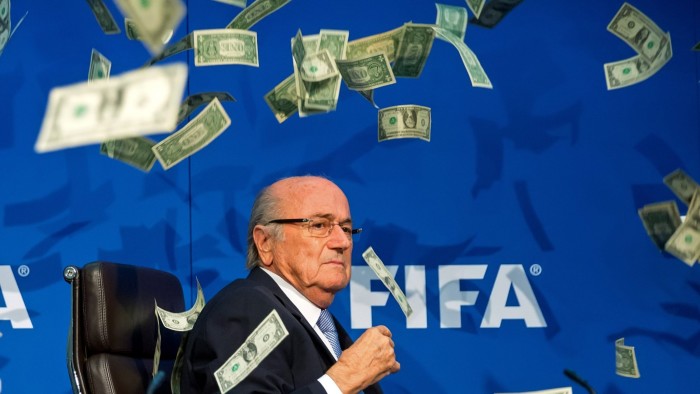Five lessons brands can learn from sports scandals

Roula Khalaf, Editor of the FT, selects her favourite stories in this weekly newsletter.
It has been an awkward year for companies sponsoring sport. Football, athletics and tennis have been dragged through allegations of corruption, doping and match-fixing. At the same time, with the Euro 2016 Championship in France and the Olympics in Brazil, spending on sport sponsorship could be higher than ever this year. Here are five lessons brands should learn from past disasters:
Don’t panic
The barrage of criticism in the media, even when directed at sponsors, may not be as damaging as it seems.
“There is no evidence that the huge public negativity around Fifa officials’ behaviour has had any effect on key sponsors,” says Peter Walshe, BrandZ strategy director at Millward Brown, which is part of the WPP group.
“Looking at our data, if you look at five key Fifa sponsors over the past year — Adidas, Budweiser, Coca-Cola, McDonald’s and Visa — their brand value, with the exception of Coke, all went up, by an average of 5 per cent. On average, the top 100 brands only rose by 3 per cent.”
He adds that the brands had also done well when customers were asked to rate which companies they trusted.
“You might have expected that trust would reduce. Actually it went up a bit. On the trust index they averaged 112 before scandal, and a year later, 117. The benchmark is the top 100 brands, which again are more trusted than others. They only went up 1 point.”
Fans will always love sport
Despite corruption, doping and match-fixing, sport remains one of the most effective ways for companies to reach out to billions of fans across the world.
If you happen to sponsor a scandal-stricken organisation, try to distance yourself from the institution while retaining links with the sport itself.
“These incidents have been unbelievably damaging to the brand of Fifa,” says Michael Payne, former head of communications for the International Olympic Committee. “A few years ago you might not have thought twice about putting the Fifa logo on your communications as a badge of honour, in the same way you used the Olympic rings.
“Now you probably say, ‘I want to be talking about the World Cup and the passion people have for it and you will forgive me if I’m not putting Fifa in spotlights at the top of the ad campaign.’”
He adds: “I am not sure that when it comes to sponsoring the 2022 tournament in Qatar, that there will be a lot of reference to Qatar.”
Of course, he says, there may be some pushback: “Fifa will say the name of the event is the Fifa World Cup, not the World Cup.”
Some sports will be hit harder than others
Football is uniquely popular around the world, but if you sponsor a minor sport and scandal hits, you will have to evaluate the situation more carefully.
After years of accusations, doping is now thought to be endemic, for example, in athletics and cycling. When news broke that figures close to the top of athletics also took bribes, Nestlé was quick to act to cancel its deal with the International Association of Athletic Federations.
“In terms of athletics, the sport is suffering because its presentation is old-fashioned, its relevance is under question, and how will they rebuild trust?” says Patrick Nally, who helped Fifa commercialise in its early years. “[If I were a sponsor] I would be seeking some significant assurances that they would respond to radical change, and the drug element is just one small piece.”
If you have gambled on an individual, make sure you have good lawyers
One of the best ways to reach a younger audience is to focus on the athletes. Even when she is not playing tennis, Maria Sharapova has 1.6m followers on Instagram, the photo-sharing service.
“The benefits of sponsoring a star are great, but the risk is great, too,” says Mr Walshe.
For years, sponsors have included morality clauses in their contracts with athletes so that, if disgrace occurs, they can cut their losses.
Go in with your eyes open, says Mr Nally. “You take the chance based on all the criteria you can check. There have been enough incidents now. You have to look at what you would do if something goes wrong, but there are now plenty of consultants and risk assessors. It is very professional, very sophisticated.”
How you react to a scandal depends on who you are
“If you are Visa and it is trust in finance which defines your brand, the moment that something is jeopardising that, you are bound to react fast,” says Mr Walshe.
If you are Adidas, you may judge that you could stay loyal for longer. But timing is everything — even in a bad situation, by acting ahead of other sponsors you can burnish your brand.
Mr Walshe adds: “If you behave in a fair, transparent and first-mover way, justified by the circumstances, that is seen as a positive . . . Being slow to react is never a good thing in any crisis.”
Comments